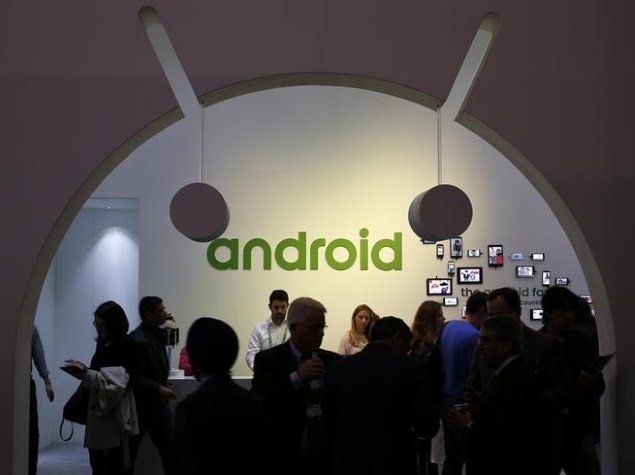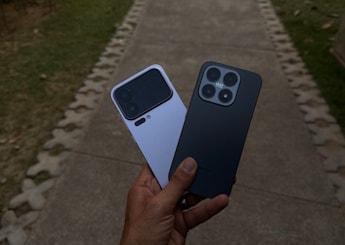- Home
- Mobiles
- Mobiles News
- Google Rivals Said to Urge US Justice Department to Probe Android
Google Rivals Said to Urge US Justice Department to Probe Android

A small number of technology companies have complained to the Department of Justice that the Android mobile operating system is anti-competitive, said the sources, who declined to be named to protect business relationships.
Google reached a settlement in 2013 with the U.S. Federal Trade Commission over Web search allegations. Any new action by U.S. regulators would be a major risk for the company in its home market.
However, regulators often speak with companies about fairness complaints without the discussions leading to an investigation, and Google has already successfully fought off a U.S. civil suit involving Android.
The meetings between Google critics and regulators predate Wednesday's announcement by the European Union after a five-year probe that Google distorted Web search results to favour its own shopping service. The EU also opened another antitrust investigation into Android.
Google has been accused anti-competitive conduct in the United States and Europe because of the control it exerts over handset makers who want to use its smartphone operating system. Tech companies have complained about requirements that they give Google search, maps and other products a prominent place on the handsets.
Gary Reback, a Carr Ferrell LLP attorney who battled Microsoft Corp in the 1990s and has spent much of the past decade fighting Google, predicted that more companies would reach out to regulators in coming months.
"Stay tuned on Android. There are going to be more complaints from apps people," he said at a panel discussion hosted on Wednesday by anti-Google industry coalition Fair Search. The coalition includes Microsoft, Expedia Inc and Nokia Oyj.
However, Google might have some legal ammunition to fight a potential investigation of Android.
Earlier this year, a federal judge in San Jose, California dismissed a consumer class action lawsuit alleging Google requires handset makers to make Google search the default on Android phones, which helps it stay dominant in search.
By forbidding competitors such as Microsoft to pay for prime placement on screens, Google inflated the cost of Android phones for consumers, the lawsuit said.
U.S. District Judge Beth Labson Freeman ruled that the allegations consumers were harmed were "too speculative" for the lawsuit to proceed. The plaintiffs uncovered no facts to indicate Google's conduct "prevented consumers from freely choosing among search products or prevented competitors from innovating," the judge wrote.
The plaintiffs have since withdrawn the case. Steve Berman, an attorney for the consumers, could not immediately be reached for comment about whether they would try to refile the suit in light of the European announcement.
One legal expert said it would be very hard for the U.S. government to win an antitrust lawsuit involving Android. It would have to show, for example, that the agreements with phone makers severely restricted the ability of customers to substitute apps.
"This has been a recurring problem in these Google investigations: that the squawking has come mainly from competitors," said Herbert Hovenkamp, a law professor at the University of Iowa.
The U.S. Federal Trade Commission closed its case in January 2013 after requiring Google to stop "scraping" reviews and other data from rival websites for its own products. The FTC also demanded that advertisers be allowed to export data to evaluate advertising campaigns independently.
Google and the Justice Department declined comment for this story.
© Thomson Reuters 2015
Catch the latest from the Consumer Electronics Show on Gadgets 360, at our CES 2026 hub.
Related Stories
- Samsung Galaxy Unpacked 2025
- ChatGPT
- Redmi Note 14 Pro+
- iPhone 16
- Apple Vision Pro
- Oneplus 12
- OnePlus Nord CE 3 Lite 5G
- iPhone 13
- Xiaomi 14 Pro
- Oppo Find N3
- Tecno Spark Go (2023)
- Realme V30
- Best Phones Under 25000
- Samsung Galaxy S24 Series
- Cryptocurrency
- iQoo 12
- Samsung Galaxy S24 Ultra
- Giottus
- Samsung Galaxy Z Flip 5
- Apple 'Scary Fast'
- Housefull 5
- GoPro Hero 12 Black Review
- Invincible Season 2
- JioGlass
- HD Ready TV
- Laptop Under 50000
- Smartwatch Under 10000
- Latest Mobile Phones
- Compare Phones
- Honor Magic 8 RSR Porsche Design
- Honor Magic 8 Pro Air
- Infinix Note Edge
- Lava Blaze Duo 3
- Tecno Spark Go 3
- iQOO Z11 Turbo
- OPPO A6c
- Samsung Galaxy A07 5G
- Lenovo Yoga Slim 7x (2025)
- Lenovo Yoga Slim 7a
- Lenovo Idea Tab Plus
- Realme Pad 3
- Moto Watch
- Garmin Quatix 8 Pro
- Haier H5E Series
- Acerpure Nitro Z Series 100-inch QLED TV
- Asus ROG Ally
- Nintendo Switch Lite
- Haier 1.6 Ton 5 Star Inverter Split AC (HSU19G-MZAID5BN-INV)
- Haier 1.6 Ton 5 Star Inverter Split AC (HSU19G-MZAIM5BN-INV)







![[Sponsored] Haier C90 OLED TV | Dolby Vision IQ, 144Hz OLED and Google TV in Action](https://www.gadgets360.com/static/mobile/images/spacer.png)









